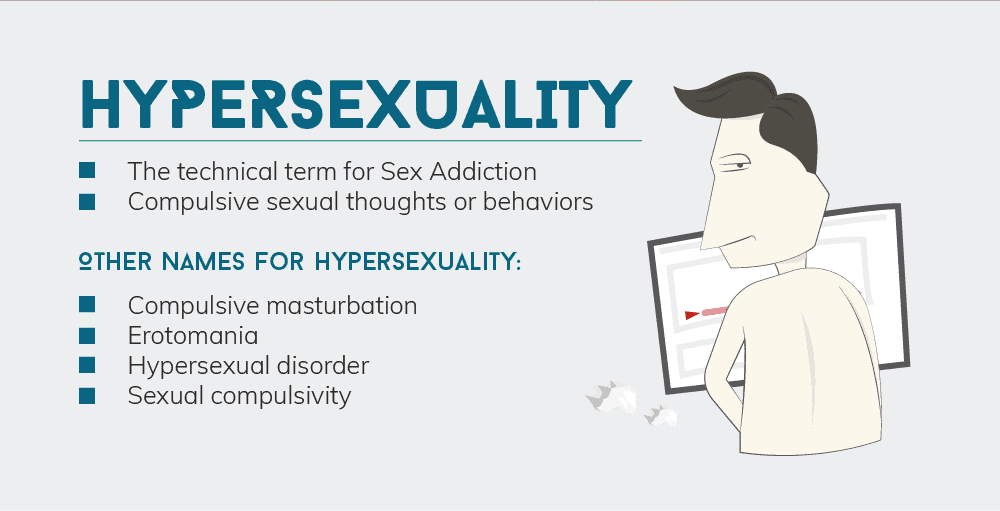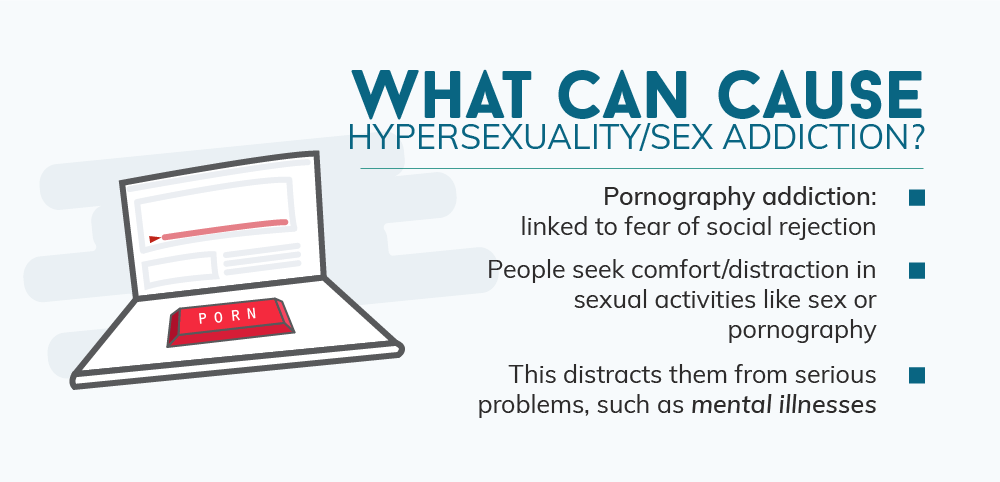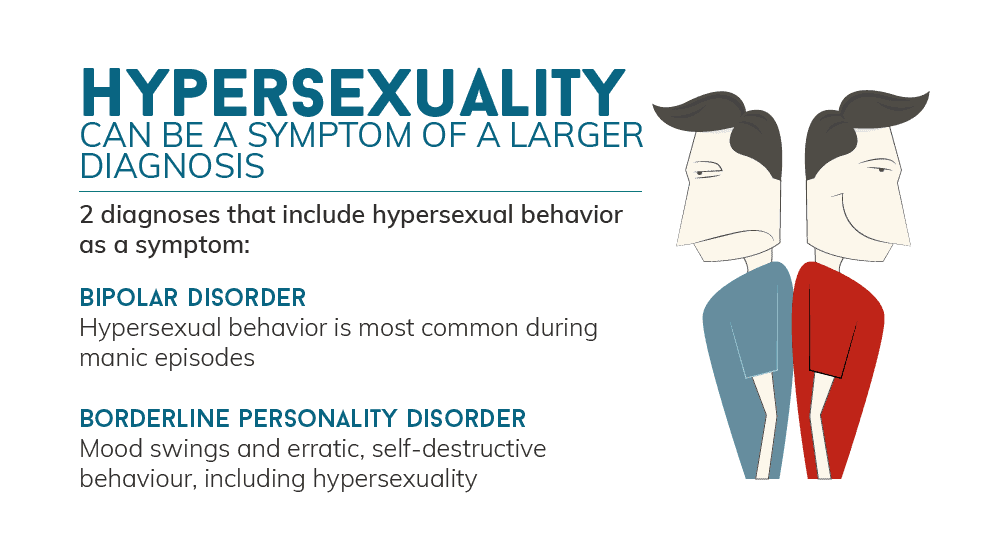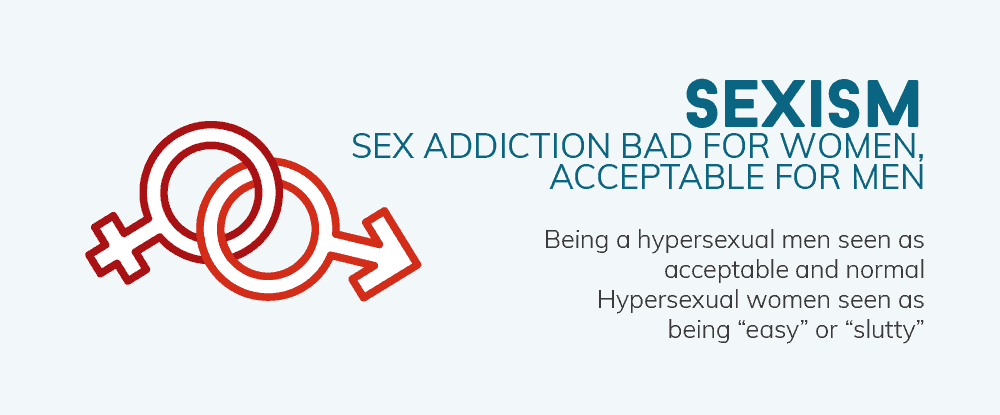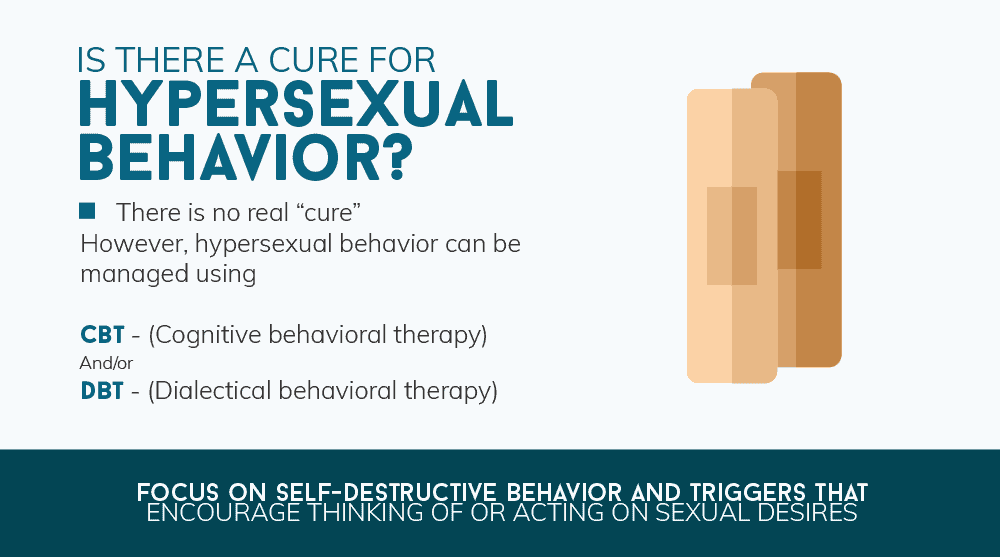How often do you watch porn? It may be an uncomfortable question. It’s likely not something you talk about often with your friends. Watching porn is usually a solitary activity done in the privacy of your room. You most likely don’t talk about it with many people, nor do you share how often you watch it. Or how about casual sex? Do you find yourself going out and meeting people simply to sleep with them? Do you find yourself thinking about sex in general abnormally often throughout the day? Does sex occupy your mind to the point where it impacts your day or the way you behave? If any of these apply to you, you may be dealing with hypersexuality. If you deal with an overwhelming desire or urge for sexual activity to the point where it distracts you from everyday life. Much debate revolves around hypersexuality and its diagnosis; hopefully you learn a bit more about the disorder.
What is Hypersexuality? Is it the Same Thing as Sex Addiction?
Hypersexuality is the technical term for sex addiction, but there are many different names for it:
- Compulsive masturbation
- Compulsive sexual behavior
- Erotomania
- Hypersexual disorder
- Problematic hypersexuality
- Sexual compulsivity
- Sexual dependency
Regardless of the term used to describe it, hypersexuality/sex addiction refers to compulsive sexual thoughts or behaviors. These thoughts and behaviors occupy much of your time and often impact your performance in other areas of your life, such as at school or work. Hypersexual behavior manifests itself in many different types of activities such as:
- Masturbation
- Pornography
- Sexual encounters
- Cybersex
- Phone sex
- Strip clubs
- Cheating on a partner or spouse
There are multiple other ways hypersexuality is acted upon. The key to the diagnosis of hypersexual disorder is the amount of time spent on sexual activity as well as the impact it has on your life. When the overt sexual behavior begins to impact your life, there is a problem that needs to be addressed and worked on. Much debate revolves around the diagnosis of hypersexuality. Some researchers claim it is a disorder, others see it as only a symptom of a more pervasive mental illness, and still others view it as not a disorder at all, but a result of the way society views overly sexual behavior.
What Can Cause Hypersexuality?
Hypersexuality generally stems from anxiety disorders or depression. Many individuals seek comfort or distraction through sexual activities like consensual sex or pornography. Sexual activity can help to pass the time and keep your mind off of other more pervasive problems, such as various mental illnesses. Those with addictions to pornography often find their behavior comes from a fear of social rejection. Rather than trying to find someone in real life to take out or take home, they stay in and live out fantasies through videos and pictures on the Internet. Sex addiction can also stem from abuse during childhood. If there was sexual abuse, sometimes acting out with hypersexual behavior gives the individual a feel of control over their body that they didn’t have before. Researchers need to continue studying sex addiction in order to determine more about it. Whether there is an innate biological cause for hypersexuality has yet to be determined. Mostly environmental factors are considered the cause at the current moment.
How Do You Know if You’re Dealing With Hypersexuality or Sex Addiction?
You can conduct a quick quiz of yourself to determine whether you are showing signs of hypersexuality:
- Do you spend excessive amounts of time thinking of, planning, or fantasizing about sexual encounters?
- Do you engage in these sexual encounters as a result of a depressed mood, anxiety, boredom, or loneliness?
- Do you masturbate for extended periods of time?
- Have you tried to stop engaging in these sexual encounters and found yourself unsuccessful?
- Do you engage in sexual encounters regardless of the harm you place yourself or others in?
- Do you continue to engage in sexual behavior despite its impact on your work performance or social involvement?
If some of these questions felt like you could answer “Yes” you may be dealing with hypersexuality. It is never a good idea to diagnose yourself, though; you should always seek the assistance of a mental health professional. These signs of hypersexual behavior can help indicate the presence of disordered behavior but only a professional should give an official diagnosis. This is important because sometimes hypersexuality is actually just a symptom of a more pervasive disorder. Rather than handling just the sex addiction, the mental health professional you work with can provide a well-rounded, comprehensive approach to treatment.
Hypersexuality as a Symptom Rather Than a Diagnosis
Hypersexuality can sometimes be a symptom of a larger diagnosis, rather than a diagnosis in and of itself. Two diagnoses that include hypersexual behavior as a symptom include bipolar disorder and borderline personality disorder. Bipolar disorder includes periods of time called “manic episodes,” where the individual will behave impulsively. Hypersexual behavior in individuals with bipolar disorder is most common during these manic episodes. Those with borderline personality disorder conduct themselves erratically, with mood swings occurring over periods of hours rather than days or months. They tend to act out in self-destructive manners, including hypersexual behavior, drug and alcohol addiction, eating disorders, or self-harm. When considering whether you may have a sex addiction, it is important to explain your whole list of symptoms to your doctor. This will help them determine whether your hypersexuality behavior should be diagnosed on its own or as a part of a larger diagnosis like bipolar or borderline personality disorder.
Hypersexuality and the Nymphomaniac: The Role of Sexism in Sex Addiction
Men are commonly seen as more sexual than women, but their increased sexuality is also seen as more acceptable. Statistics such as “men think about sex every seven seconds” are commonly tossed around. (The accurate statistic is around 19 times a day for men, 10 times a day for women). These incorrect statistics push the sexism surrounding hypersexuality further. Women with overt sexual behavior are often seen as “slutty” or “easy,” whereas men do it to “score.” What creates this difference? Why are men allowed to have as much sex as they want while women are seen as behaving inappropriately? The dated term “nymphomaniac” referred to women with unnaturally active sexual desires and behaviors. Where was the term for men with unnaturally active sexual desires? Why was this term only ascribed to women? It is interesting to consider the sexism at play in the diagnosis of sex addiction. Psychologist Debra Soh says she treats more men for hypersexuality than women. Since men do have higher sex drives, does this lead to their overt sexuality being more acceptable? They are not the ones who get pregnant as a result of hypersexual behavior, therefore their “consequences” are not as great. Not that a child is a consequence, but women are on the receiving end of the game. Are they expected to maintain “proper” sexual conduct in order to not get pregnant? This question undoubtedly opens a can of worms too large to contain in this blog post. But it is still something worth considering.
Is There a Cure for Hypersexual Behavior?
Cognitive behavioral therapy (CBT) and dialectical behavioral therapy (DBT). DBT is a modified form of CBT and was developed in the 1980s. Both forms of therapy aim to change behavior by working with the mind. CBT and DBT operate under the idea that by changing thoughts you can change behavior. DBT is particularly helpful when treating hypersexual disorder due to its focus on self-destructive behavior. During DBT, you and your therapist focus on the triggers that encourage you to think of or act on your sexual desires. The therapist teaches coping skills and mechanisms to help you manage these triggers and learn to work through them. There isn’t a “cure” necessarily, but through the use of CBT and/or DBT, hypersexual behavior can be managed. By learning to work through your sexual urges, you can get a handle on your hypersexuality and learn to function normally again. Sex addiction is still a widely misunderstood disorder and researchers need to conduct more studies to fully understand it. As the Diagnostic and Statistical Manual of Mental Disorders sees further revisions, hypersexual disorder will likely see changes as well. Again, if you think you are dealing with hypersexuality in your own life, consult a mental health professional. Make the decision to get to the root of the problem and find a way to get back to living life normally, to having healthy relationships, free of sex addiction, once again. Hypersexual behavior doesn’t have to define you any longer than you decide it needs to.
What Did you Think About This Blog?
Give it a Rating!
Full Infographic:



